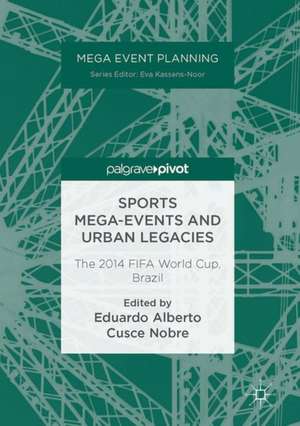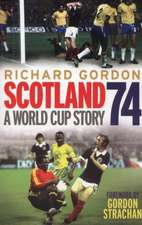Sports Mega-Events and Urban Legacies: The 2014 FIFA World Cup, Brazil: Mega Event Planning
Editat de Eduardo Alberto Cusce Nobreen Limba Engleză Hardback – 5 dec 2016
It further provides detailed empirical evidence that highlights a growing trend in sporting mega events: the overestimation of benefits and an underestimation of costs involved in hosting. The book adds to the critical literature that provides a counterweight to governments' aspirations to use mega events for the purposes of development and/or globalization, irrespective of the views of their citizens.
| Toate formatele și edițiile | Preț | Express |
|---|---|---|
| Paperback (1) | 413.07 lei 6-8 săpt. | |
| Springer International Publishing – 4 iul 2018 | 413.07 lei 6-8 săpt. | |
| Hardback (1) | 418.07 lei 6-8 săpt. | |
| Springer International Publishing – 5 dec 2016 | 418.07 lei 6-8 săpt. |
Preț: 418.07 lei
Nou
Puncte Express: 627
Preț estimativ în valută:
79.100€ • 83.52$ • 66.21£
79.100€ • 83.52$ • 66.21£
Carte tipărită la comandă
Livrare economică 04-18 aprilie
Preluare comenzi: 021 569.72.76
Specificații
ISBN-13: 9783319440118
ISBN-10: 331944011X
Pagini: 194
Ilustrații: XV, 163 p. 19 illus.
Dimensiuni: 148 x 210 x 17 mm
Greutate: 0.34 kg
Ediția:1st ed. 2017
Editura: Springer International Publishing
Colecția Palgrave Macmillan
Seria Mega Event Planning
Locul publicării:Cham, Switzerland
ISBN-10: 331944011X
Pagini: 194
Ilustrații: XV, 163 p. 19 illus.
Dimensiuni: 148 x 210 x 17 mm
Greutate: 0.34 kg
Ediția:1st ed. 2017
Editura: Springer International Publishing
Colecția Palgrave Macmillan
Seria Mega Event Planning
Locul publicării:Cham, Switzerland
Cuprins
Chapter 1. The 2014 FIFA World Cup in Brazil: Hosting a Sport Mega-Event in a BRIC Context.- Chapter 2. Belo Horizonte: The Urban Impact and Contested Legacy of a Mega-Event.- Chapter 3. Fortaleza: Real Estate Appreciation, Removals and Conflicts.- Chapter 4. Natal: Football, Urban Coalitions, Real Estate: New and Old Relations.- Chapter 5. Porto Alegre: The Entrepreneurial City.- Chapter 6. Recife: Much to do about Nothing.- Chapter 7. Rio de Janeiro: Social and Urban Impacts of the Maracanã Stadium Renovation.- Chapter 8. São Paulo: Sports Mega-Events and the East Zone Local Development.- Chapter 9. The Cup Final Score: What went wrong?.
Notă biografică
Eduardo Alberto Cusce Nobre is a Professor in the Faculty of Architecture and Urban Planning, University of São Paulo, Brazil.
Textul de pe ultima copertă
This book examines the urban legacy of the 2014 football World Cup in Brazil across the seven cities that hosted matches. The authors, all experts and natives of South America, analyse the context and impacts of hosting the World Cup for each of the host cities. The chapters use a range of background data and local knowledge and understanding to critically assess what benefits or disadvantages came along with bidding for and hosting World Cup final games, and importantly considers who the beneficiaries where and are.
It further provides detailed empirical evidence that highlights a growing trend in sporting mega events: the overestimation of benefits and an underestimation of costs involved in hosting. The book adds to the critical literature that provides a counterweight to governments' aspirations to use mega events for the purposes of development and/or globalization, irrespective of the views of their citizens.
Eduardo Alberto Cusce Nobre is a Professor in the Faculty of Architecture and Urban Planning, University of São Paulo, Brazil.
Caracteristici
Includes contributions from leading Brazilian scholars in Urban and Regional Studies, Architecture and Planning Offers a timely contribution to a growing critical literature on sports mega events Addresses political, social and economic issues which arise from the hosting of a mega-event

















